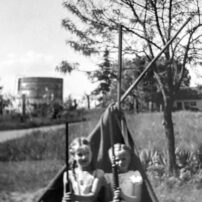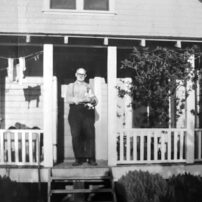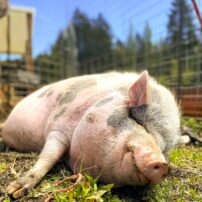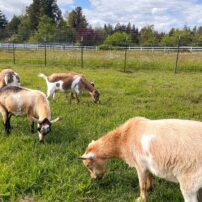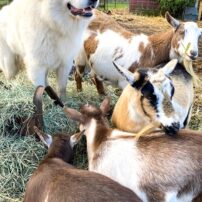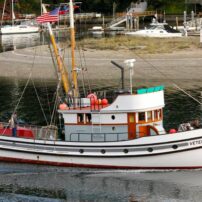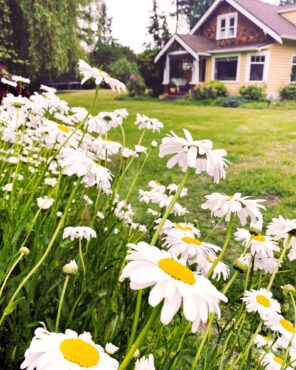 Roots run so deep at WillaBella Farm in Gig Harbor that they go all the way back to 1912. The unassuming farmhouse, with its fir lumber flooring and arched doorways, still stands. As does the guest house, which was first a woodworking shop. From the grape vines to the heirloom orchard of apple, pear, cherry and plum trees, WillaBella Farm stands as a testament to the hard work and dreams of its owners.
Roots run so deep at WillaBella Farm in Gig Harbor that they go all the way back to 1912. The unassuming farmhouse, with its fir lumber flooring and arched doorways, still stands. As does the guest house, which was first a woodworking shop. From the grape vines to the heirloom orchard of apple, pear, cherry and plum trees, WillaBella Farm stands as a testament to the hard work and dreams of its owners.
In its 113 years, the farm has been cared for by two families: the Hansens and the Roses. The Roses purchased it in 2004 and have not only carried what the Hansen family begun but have also added to the farm. WillaBella continues to offer heirloom varieties of fruit and vegetables, as well as some new crops such as kiwi and native berries, all grown without any harmful sprays or pesticides.
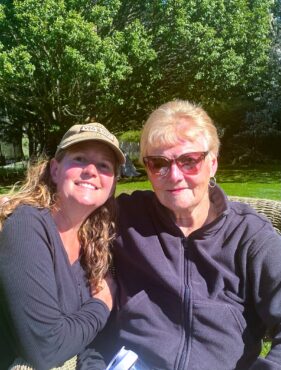
Norwegian Immigrants Arrive
Escaping a potato famine that plagued Europe in the late 1800s to the early 1900s, two brothers departed from Norway, along with their mother, wives and children, to make a new life in the United States in 1900.
The family stopped in Wisconsin for a time and eventually continued west. The Hansen brothers, Ole and Emmanuel, acquired adjacent parcels, a total of 30 acres, on Point Fosdick Drive. They cleared some of the land, built their homes, farmed and raised their families in the early 1910s.
Ole Hansen constructed the 1,200-square-foot, two-story farmhouse in 1912 with the help of his brother and nephews. He raised his four children there, including Oswald, who grew up and married Edna, an English girl who lived in Rosedale. The two of them lived in the house with Oswald’s parents and grandmother, farmed the land and raised Mary and her sister in a four-generation household.
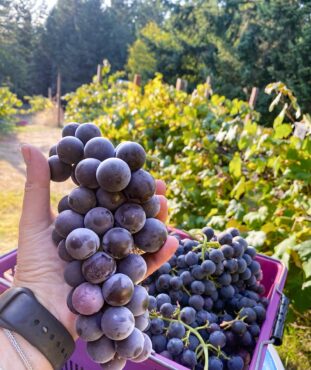 Mary Hansen, who is now in her 80s, recalls growing up there with her parents and grandparents.
Mary Hansen, who is now in her 80s, recalls growing up there with her parents and grandparents.
“My grandfather was a sea captain in Europe and captained the Clipper,” Hansen said.
She still has the documents that show her grandfather Ole Hansen’s discharge from the British Merchant Marines in 1878, as well as his naturalization papers.
When Hansen was a young girl, eggs, fryer chickens and grapes were her family’s main supportive endeavors.
“Henry grew up next door, my cousin, and he and my dad developed the breed, the Hansen Leghorn,” she said. “There was a brooder house here, and they’d bring baby chicks and we’d get about 200 at a time, and we’d sell the eggs. The co-op would get truckloads every week.
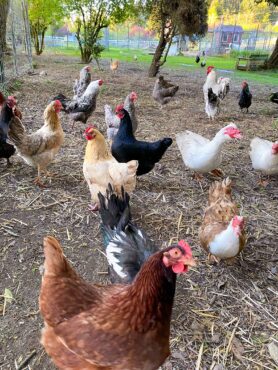 “The whole hillside was grapes and they would haul the grapes out to Stretch Island, and I think they made wine, so that was a supportive crop. We raised everything, supporting ourselves. The hardest part was raising beef. My dad didn’t want to kill those, so we stopped doing that. I’m a product of fish and chicken, and now I don’t eat meat at all.”
“The whole hillside was grapes and they would haul the grapes out to Stretch Island, and I think they made wine, so that was a supportive crop. We raised everything, supporting ourselves. The hardest part was raising beef. My dad didn’t want to kill those, so we stopped doing that. I’m a product of fish and chicken, and now I don’t eat meat at all.”
A creek that runs through several properties, including the farm, was the only source of water for them at that time. Water from the creek was pumped up to the house and farm with a hydraulic ram that uses hydropower, which deposited it into a cistern that sits at the top of the hill. The creek is now overgrown with weeds and is no longer used to sustain the farm.
With plenty of fruits and vegetables, eggs and other things to share, the family did just that, Hansen said. Her parents were quick to share with neighbors and were friendly with the indigenous people who camped along the beach on Wolochet Bay.
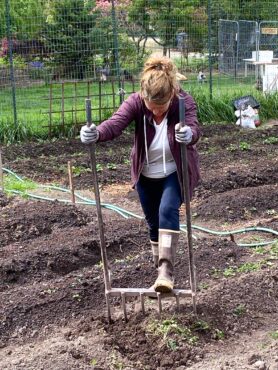 “The beaches were public beaches, they weren’t owned,” Hansen said. “So, the camps were down there on Wollochet Bay. There wasn’t trading — it was sharing. If they had extra, they’d share it with us, and we shared what we had with them. That’s just how it was back then. And my parents and grandparents were strangers to this place. But when I was growing up, everyone knew their neighbors.”
“The beaches were public beaches, they weren’t owned,” Hansen said. “So, the camps were down there on Wollochet Bay. There wasn’t trading — it was sharing. If they had extra, they’d share it with us, and we shared what we had with them. That’s just how it was back then. And my parents and grandparents were strangers to this place. But when I was growing up, everyone knew their neighbors.”
That’s also where Hansen learned to swim and where her mother kept a rowboat. They used it to row out into the bay and fish for salmon for dinner, which Hansen said were plentiful then. She left for college and graduated with a teaching degree from Washington State University. Hansen moved to Hoquium to teach middle school and high school physical education and health. But the Point Fosdick home and farm have always been a part of her.
Hansen’s mother, Edna, lived there until her death, and then the home sat empty for a while. Hanse said it was important to her that the property go to a buyer who would appreciate the history and become a caretaker of her childhood home that held so many core memories for her. She didn’t want it to be sold to a developer.
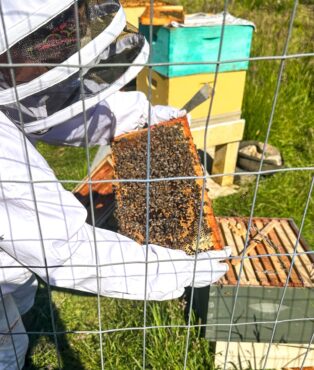 A New Family Purchases the Farm
A New Family Purchases the Farm
Kathleen and Scott Rose were expecting their first child and looking for a property in Gig Harbor when they came across the listing for the Hansen farm, which was just shy of 10 acres.
“That same day, we sat down and talked, and I said I want to raise my babies here,” Kathleen Rose said. “We moved here, and I knew nothing about orchards or farming. I was in corporate medical sales, and my husband was a firefighter.”
Rose said she was excited to live on the farm, but the abundance of fruit in those first years was overwhelming. Oswald Hansen had planted the fig trees, and Mary remembers that neighbors discouraged her father, telling him they wouldn’t grow here. He planted them anyway, and the fig trees were so prolific that the Hansens developed a fig bread recipe.
At first, the couple weren’t sure what to do with all of the fruit. Rose happened to mention to their accountant that it felt like figs were raining from the sky, and the accountant suggested selling them at a farmers market. Her father-in-law, Gene, helped her bring the figs to the Gig Harbor Farmers Market, which was located in Stroh’s field on Kimball Drive at the time. She had success selling them — and thus began her venture into farming. The figs are still in demand, she said.
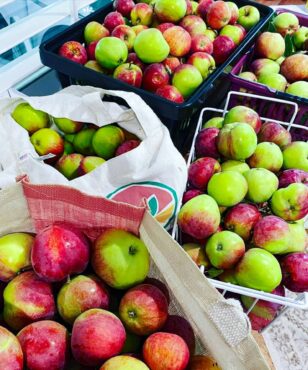 “People order figs by the case, and restaurants want them,” Rose said.
“People order figs by the case, and restaurants want them,” Rose said.
A Passion in Retirement
Rose said she wakes up every day excited to plant something. WillaBella Farm is her passion. Since she and her husband retired last year, she has been able to live out the dream they both envisioned when they purchased the farm. She is in charge of planting and tending the crops, while he is the farm-to-table family chef.
Once she began learning more about growing food, Rose wanted to continue what the Hansens had started. She sustains the land as a permaculture and hügelkultur farm. Hügelkultur is a technique of planting crops in mounds of dirt that incorporates wood twigs, along with other compostable material.
WillaBella is a pesticide-free farm, and Rose said that she maintains the microbiome in the soil with companion planting and other techniques to prevent pests and disease. She doesn’t use sprays or harmful chemicals.
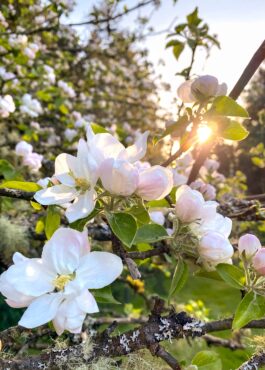 After selling that first load of figs at the market, Rose began studying ways to continue to farm organically and become self-sustaining. She reuses and recycles whatever she can. Growing crops requires her to pay close attention to the weather predictions, something that she didn’t think much about before becoming a farmer.
After selling that first load of figs at the market, Rose began studying ways to continue to farm organically and become self-sustaining. She reuses and recycles whatever she can. Growing crops requires her to pay close attention to the weather predictions, something that she didn’t think much about before becoming a farmer.
Rose has a bachelor of science clinical degree from the University of Washington and worked for 15 years in clinical diagnostics and medical research sales, focused primarily on microbiology and immunochemistry. But farming was not part of her formal education. Over the years, she has continued to learn and is now a beekeeper and a certified Master Gardener.
To manage it all, she plants in 60-by-100-foot spaces and maintains eight of those, producing a variety of vegetables as well as strawberries. Instead of tilling the soil, which can kill microbiomes, she hand-turns it with what is called a broadfork. Those rows of vegetables grow adjacent to where the animals are kept, making the soil fertile and providing a natural garbage disposal. She tosses scraps and weeds over the fence, and the goats, chickens or the pig take care of it. In the back of the house, fertile soil that holds all of the benefits of the old chicken operation supports a plot dedicated to raspberry bushes.
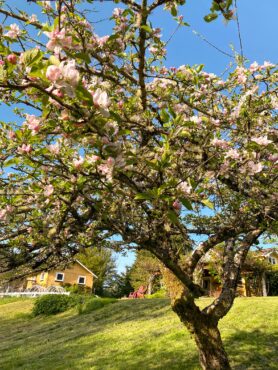 Heirloom Varieties Need TLC
Heirloom Varieties Need TLC
With extra love and special pruning, Rose has been able to maintain what remains of the original grape orchard, which is more than 100 years old. Gravenstein apple trees stood along one side of the farm when the Roses bought the property, but those varieties are susceptible to apple maggot. Instead of removing the trees, her solution was to have an expert come and graft Williams Pride apple trees onto them, creating a regenerative, healthy ecosystem to reduce pests and disease. She said the apples from those trees are delicious.
“We have healthy orchards, and there are no sprays ever,” Rose said. “If you want to build a healthy ecosystem, it works.”
Trying New Things
Over the years, Rose has experimented with many fruits, including kiwi, which she said are a treat each season. With a desire to keep the farm as authentic to its origin as possible, Rose has incorporated native berries that she purchases from the conservation district. Salmonberry, huckleberry and blackberry are now being established on the other side of the grape orchard. And, she has added more honeybees, going out to save hives that have been found in unwanted places on other people’s property.
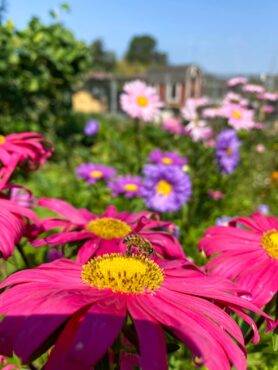 While Rose doesn’t intend to have an egg operation or raise fryer chickens, the farm now has more than 30 hens and some roosters, which she said just happens when you have laying hens. There are also ducks that eat slugs and bugs, as well as five goats, which turn the soil and eat scraps.
While Rose doesn’t intend to have an egg operation or raise fryer chickens, the farm now has more than 30 hens and some roosters, which she said just happens when you have laying hens. There are also ducks that eat slugs and bugs, as well as five goats, which turn the soil and eat scraps.
“They all have a purpose,” she said of the animals. “And my husband says those goats are eating our retirement.”
Though she tried milking the goats, she said she’s done with that, as well as the game hens and the pigs that she thought would be a good idea. Rose tried raising pigs but changed her mind when she was constantly repairing sheds and fences from their destruction and nursing her own wounds caused by the 1,000-pound animals.
“The one pig is left over from my two years of butchering Gloucestershire Old Spots pigs,” she said.
Instead, she has more than 70 other female farmers to source from for things that she needs, including the pork. She is part of the Peninsula Female Farmer Network, which includes farmers from Gig Harbor, the Key Peninsula, Bremerton, Poulsbo and Hood Canal area.
Rose enjoys sharing her knowledge with others and believes that everyone should know where their food comes from, along with the best techniques to grow it. She hosts the Farm Science Camp at the farm for children ages 6 to 12 and will also teach at a booth at the Gig Harbor Waterfront Farmers Market this summer. The youth farm stand at WillaBella Farm is open on Sundays in the summer.



